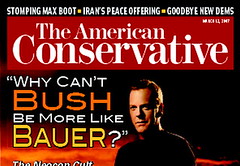Much as I enjoyed the fellowship of the past weekend in Charlottesville, there was a persistent and palpable animosity toward politics and government generally held by many of the participants. . . There was something of a gauzy sentimentality and even anarchic libertarianism that pervaded the sessions. As much as I admire Wendell Berry, his work does not sufficiently attend to the needs for, and demands of, politics. Indeed, I was struck by the similarity between two camps that otherwise might be thought to be polar opposites - agrarian communitarians and libertarians. Both are wildly optimistic about human nature and the ability of humans to "do their own thing" without the "interference" of politics and government.
At the dinner before the public session on Saturday, the participants were asked to name, among other things, the most despicable city in America. Among the few cities that were named (since most people forgot this requirement), one was Washington D.C. Washington D.C.??!!?? It may not be one of the world's great cities, but it is a fine city, and not the most despicable city in America. What about Las Vegas or Phoenix? Houston or Palm Beach? I have to think that Washington was named because it was the location of "Guvment," to quote Pap Finn.
I didn't really detect an excess of wild optimism or sentimental gauze, but then Deneen and I sat at different tables. Presumably ISI has conferences all the time where attendees hash out five point plans and develop political programs. I will pass on those. I may be too much of a sunny optimist, but I hold out hope that many people from that conference will meet up again. If so, Dr. Deneen should should sit next to me during one of the meals and I will treat him to a dose of pessimism so severe that doctors will have to tape his eyes open and force him to watch Pollyanna
To close on a pessimistic note, I was reading Richard Hofstadter's The Paranoid Style in American Politics
Since what is at stake is always a conflict between absolute good and absolute evil, the quality needed is not a willingness to compromise but the will to fight things out to a finish. Nothing but complete victory will do. Since the enemy is thought of as being totally evil and totally unappeasable, he must be totally eliminated -- if not from the world, at least from the theater of operations to which the paranoid directs his attention. This demand for unqualified victories lead to the formulation of hopelessly demanding and unrealistic goals, and since these goals are not even remotely attainable, failure constantly heightens the paranoid's frustration. Even partial success leaves him with the same sense of powerlessness with which he began, and this in turn only strengthens his awareness of the vast and terrifying quality of the enemy he opposes.
